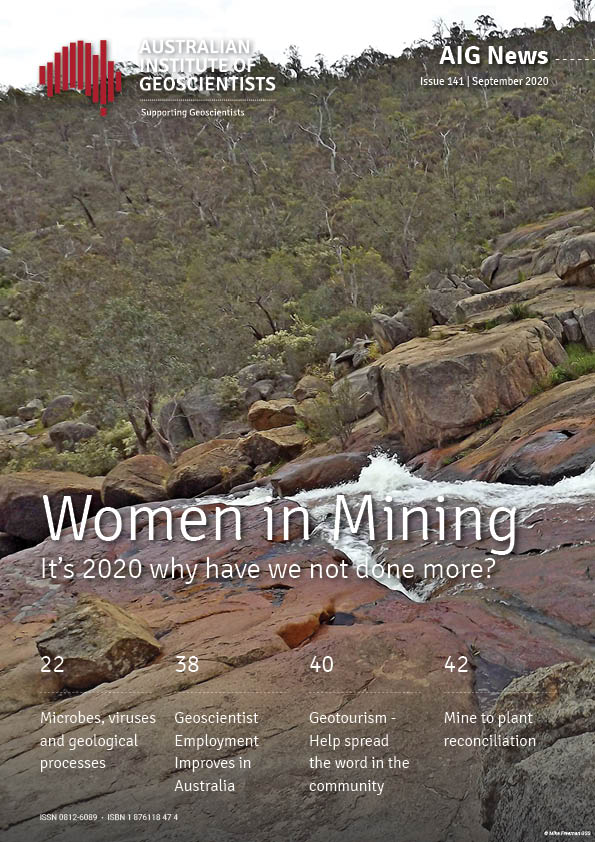
Now all AIG Members and Non Members can enjoy our FREE AIG Newsletter in digital format, including all previous editions. Please click here to see our archive of AIG News.
The latest edition of AIG News, the Australian Institute of Geoscientists member newsletter is now available in full colour and digital format and best of all FREE for all readers!
NEW! View the latest AIG News in Click here to view Flipbook! Or download the PDF below:
![]() For web: AIG News 141: Download as Single Pages PDF
For web: AIG News 141: Download as Single Pages PDF
![]() For web: AIG News 141: Download as Double Page Spread PDF
For web: AIG News 141: Download as Double Page Spread PDF
![]() For print: AIG News 141: Download as Single Pages PDF
For print: AIG News 141: Download as Single Pages PDF
![]() For print: AIG News 141: Download as Double Page Spread PDF
For print: AIG News 141: Download as Double Page Spread PDF
Inside this latest issue…
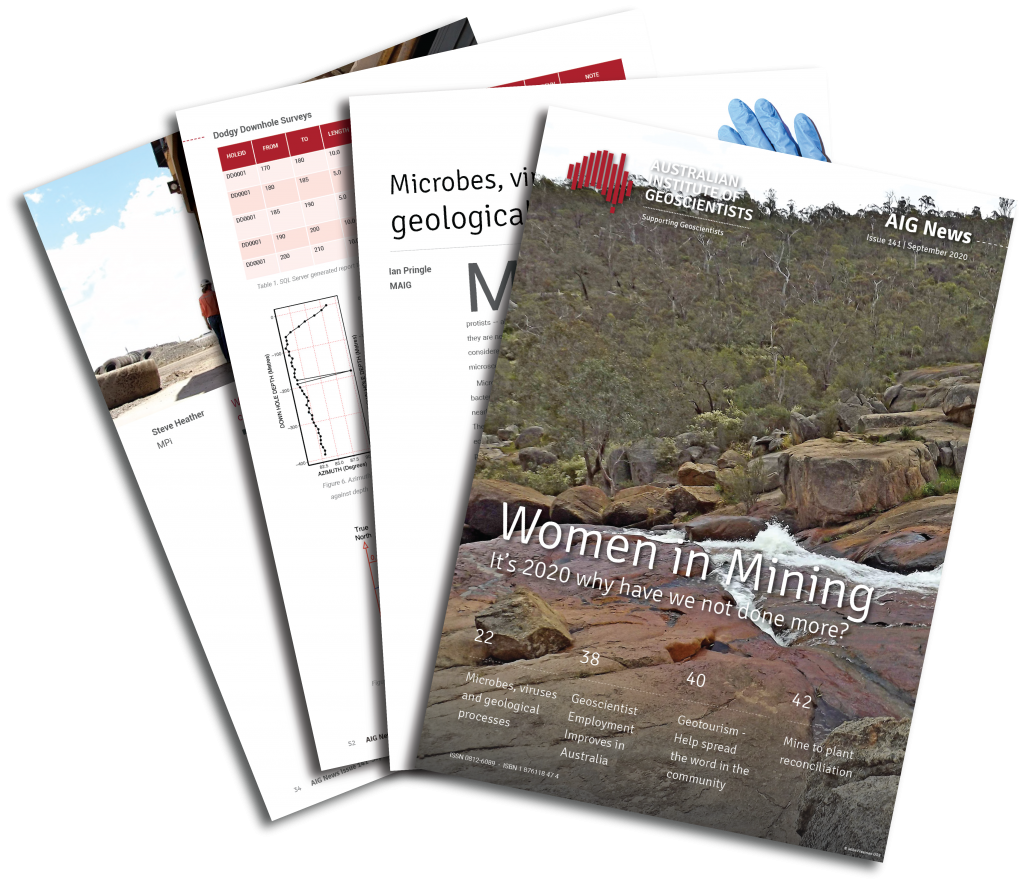
From Your President; Institute News; Membership Updates & Education Report; Microbes, Viruses and Geological Processes; Assessing the Variability of Estimates Produced by Expert Geoscientists; Breaking Occam’s Razor; Women in Mining – It’s 2020 why have we not done more?; SAEMC 2020; Geoscientist Employment Improves in Australia Despite Coronavirus Pandemic; Geotourism – Help Spread the Word in the Community Through input into AESC2021; Mine to Plant Reconciliation: A New Approach to Magnetite Banded Iron Formation Deposits, an Example From Ferrexpo; Dodgy Downhole Surveys; Events Calendar; AIG Council & AIG News and more.
AIG News is optimised to be read with Adobe Reader. Versions are available for printing (with Adobe Reader version 4.1.3 or later) or either reading on-line or downloading for reading off-line with your laptop or tablet (with Adobe Reader version 6.1.5 or later). Both versions have been tested and are compatible with Apple Preview and iBooks for Mac and iPad users.
If you experience any difficulty accessing and reading AIG News using the Adobe Reader versions listed here technical support is available.
We hope that you enjoy the latest AIG News and welcome your feedback.
21 June 1933 – 17 August 2020
We learned today of the passing of one of AIG’s original members, Michael Kriewaldt. Michael joined AIG in 1981 and held membership number 43.
Michael was a generous, regular supporter of the AIG Education Foundation.
Our thoughts are with Michael’s family and friends at this time.
Andrew Waltho
President
14 September 2020
Exploration expenditure data reported by the Australian Bureau of Statistics paints a grim picture of mineral exploration for Queensland, relative to the rest of Australia.
Data were reviewed by Brisbane-based member Doug Brewster.
Queensland attracted only 7% of all exploration investment in Australia in 2019, continuing a long decline in exploration expenditure in the state. Queensland attracted 23% of national minerals exploration investment 30 years ago. The figures examined have been adjusted for CPI.


A steep decrease that ended in 1998 is interpreted to be associated with a moratorium on granting of new exploration licences associated with the Wik native title decision, from which minerals exploration expenditure has struggled to recover. The mining and exploration boom between 2005 and 2012 was all about coal in Queensland.
New South Wales is outperforming Queensland. The state attracted about 11% of national minerals exploration expenditure in 2019, up from only 6% 30 years ago.

Minerals exploration in New South Wales appears to be benefitting from relatively recent discoveries in the Cobar Basin (e.g. Mallee Bull) and the Lachlan Fold Belt (Boda). Access to land regulations in New South Wales appear to have had little impact on mineral exploration expenditure.
Mineral exploration in South Australia, after a purple patch during the 2005-2012 boom, perhaps on the back off discoveries including Sovereign Hill and Carrapateena, appears to have gone back to sleep.
Western Australia is the favoured destination for mineral exploration investment in Australia, reflected in the state’s consistently high rankings in the annual Fraser Institute survey of exploration investment intentions in recent years. Western Australia is no less affected by native title than any other state. It does, however, have a dedicated Tenure and Native Title Branch, with liaison officers to assist explorers with access and land use agreements.
Discoveries seem to be the greatest driver of future exploration investment. Equitable native title and land access processes also appear to be important considerations for explorers in determining where to invest both exploration capital and energy.
Brisbane-based member, Doug Brewster, has commenced monitoring advertisements for geoscientist roles on Seek.com to help better understand employment trends affecting our profession.
On 3 August 2020, Western Australia had the greatest number of vacancies (accounting for 24 of 29 exploration and mining geology positions advertised on Seek).
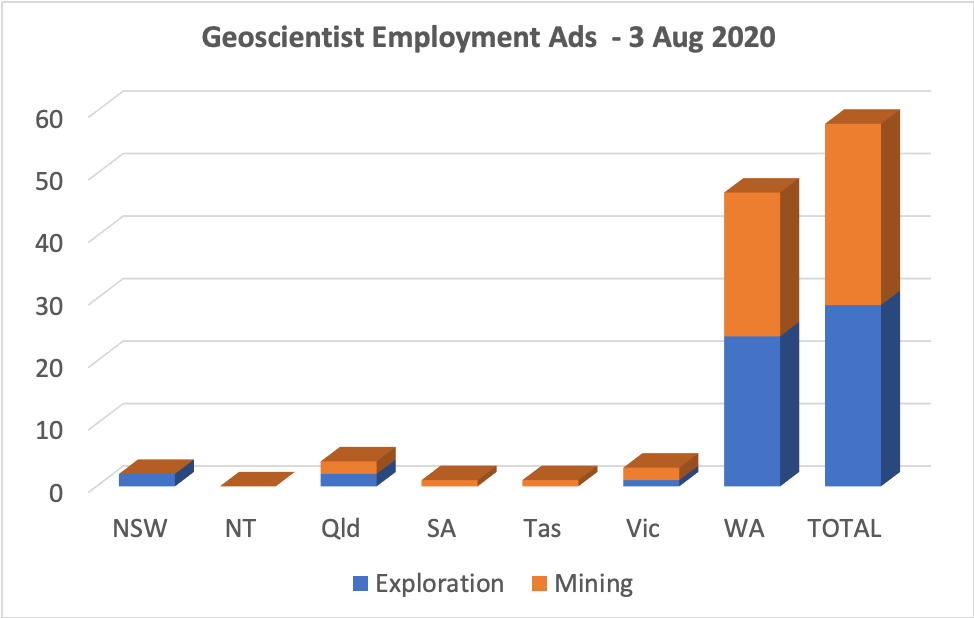
Available jobs were split evenly between exploration and mining positions.
By comparison, 87 mining engineer roles were being advertised, with Western Australia, Queensland and New South Wales dominating.
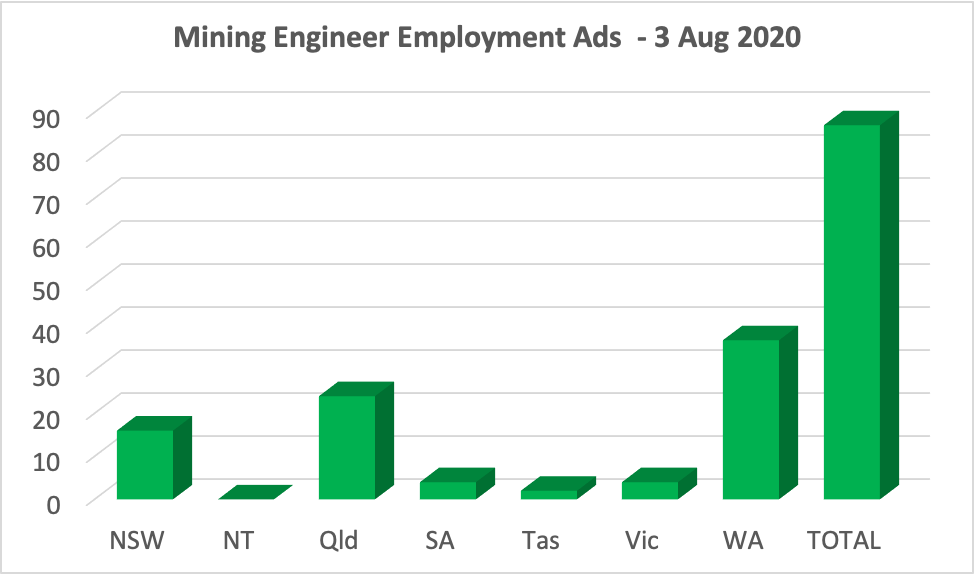
Sincere thanks to Doug for compiling this information that will, hopefully, become a regular news feature on the AIG web site.
Professor Peter Cook has been appointed interim Director of Flinders University’s National Centre for Groundwater Research and Training, following Professor Craig Simmons’ secondment to the Australian Research Council.
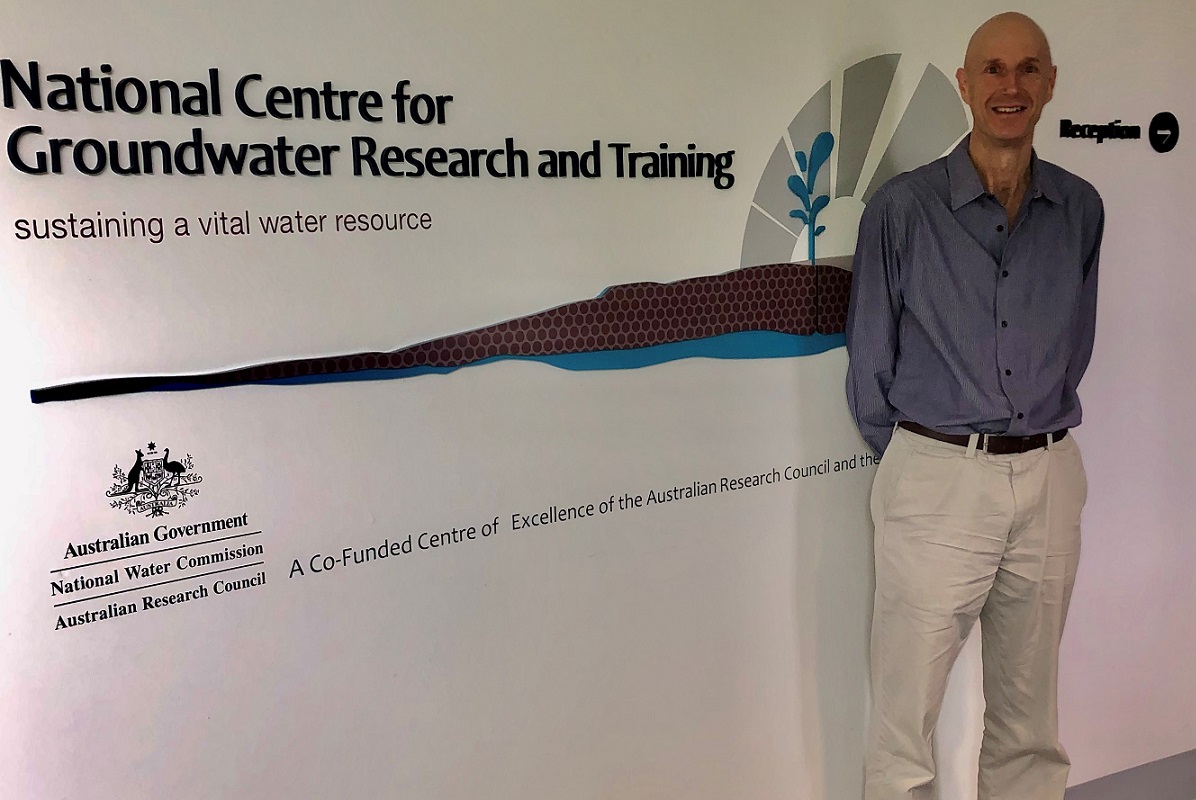
Professor Cook worked with the CSIRO for more than 20 years before moving to Flinders University where he was Deputy Director of the NCGRT between 2009 and 2014.
An internationally renowned groundwater scientist, he was the US National Ground Water Association’s Darcy Lecturer for 2009, the first scientist from outside North America to receive this honour. His research covers groundwater flow, estimation of aquifer recharge and discharge, groundwater and land salinisation, groundwater-dependent ecosystems, and water resource assessment and management for irrigation, mining and unconventional gas developments.
He has collaborated with government and industry throughout Australia, and has been acknowledged as Australia’s Field Leader in Hydrology and Water Resources by The Australian.
“The NCGRT has developed an excellent reputation for the quality of its research and has been a groundwater leader within Australia. Craig Simmons has done a fantastic job over more than 10 years to get the Centre where it is today. But we still need to bring research and industry closer together, and this will be my main goal over the next few years.” Professor Cook said.
AIG congratulates Professor Cook on his appointment.
Australian mineral exploration statistics released today contain some positive news.
Mineral exploration expenditure, in real terms, rose 11.9% ($72.7m) to $683.3m in the June quarter 2020. Brownfield exploration expenditure rose 17.5% ($67.5m) while greenfield exploration expenditure rose 2.4% ($5.3m).
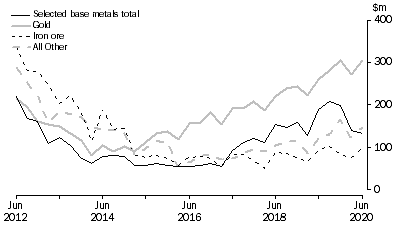
Seasonally adjusted expenditure was less positive, falling 6.8% (-$48.3m) to $665.0m in the June quarter 2020. The largest contributor to the fall this quarter was Western Australia (down 7.8%, -$33.3m).
Exploration drilling metres drilled rose 10.8%. Drilling on greenfield targets rose 5.6% and brownfield drilling metres rose 13.7%. Again, the seasonally adjusted figures fell 13.2% in the June quarter.
The real increases in both brownfield and greenfield exploration expenditure and exploration drilling are seen as having positive implications for geoscientist employment in the exploration sector. The June quarter Australian geoscientist employment survey results, released during August, confirmed this with the unemployment rate recorded by the survey improving from 10% and the end of March 2020, to 8.6% at the end of June. More than three-quarters of Australia’s geoscientists work in mineral exploration and mining.
The next Australian geoscientist employment survey will launch 30 September.

16th Biennial Meeting of the Society for Geology Applied to Mineral Deposits (SGA) 2021: Final call for session submissions
Technical Session Proposal Deadline 7 September 2020
SGA 2021 is calling for session proposals for consideration. Selected proposals will be included in the conference programme and are intended to provide an opportunity to share your knowledge and experience.
Don’t miss out! Submit your proposal today!
Click for submission information
Preliminary Session Themes Include:
Ore-forming processes
Specific mineral systems
New research and exploration developments
Geometallurgy
Sustainable mining and environmental issues
Social licence
Field Trip & Short Course Proposals – There is still time to submit!
Submission Deadline: 2 November 2020
The SGA2021 committee are considering single and muli-day field trips, pre- and post- conference.
View the preliminary field trip options for SGA 2021 around New Zealand, Australia, Indonesia, and New Caledonia on the Field Trip page for the SGA 2021 website.
AIG is proud to be supporting the Society for Geology Applied to Mineral Deposits in delivering SGA 2021.